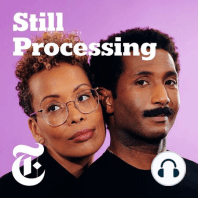56 min listen
We’re Queer - and Apparently So Is Everybody Else
FromStill Processing
ratings:
Length:
51 minutes
Released:
May 24, 2018
Format:
Podcast episode
Description
With Rita Ora, Janelle Monáe, Kehlani – and even fictional characters like Lando Calrissian – embracing bisexuality, pansexuality, queerness, and more, we wonder: what does it mean to publicly declare your sexual identity as something outside the gay/straight binary in 2018? And what did these declarations look like in the 80s and 90s, when we were growing up? We compare the sincere loneliness of R.E.M.'s "Losing My Religion" to the frustrating inauthenticity of Rita Ora's "Girls," and celebrate the thoughtful portrayal of the queer relationship featured in the new film, Disobedience. Plus, we break down what's wrong with sex scenes between women – with the hope that directors and cinematographers take note – because depictions of non-binary sexualities should reflect the humanity of the people who occupy them.Discussed this week:"The Hand That Robs the Cradle" (Ellen; Season 1, Episode 6; 1994) "Girls" (Rita Ora feat. Cardi B, Bebe Rexha, and Charlie XCX, 2018)"PYNK" (Janelle Monáe, 2018)"Curious" (Hayley Kiyoko, 2018)Kehlani's Tweets about her sexuality (2018)Kristen Stewart's SNL monologue (NBC, 2017)Disobedience (dir: Sebastián Lelio, Braven Films, 2017)"Losing My Religion" (R.E.M., 1991)Cruel Intentions (dir: Roger Kumble, Columbia Pictures, 1999)Blue is the Warmest Color (dir: Abdellatif Kechiche, Quat'sous Films, 2013)
Released:
May 24, 2018
Format:
Podcast episode
Titles in the series (100)
Oscars Preview with A.O. Scott | Episode 25 by Still Processing
